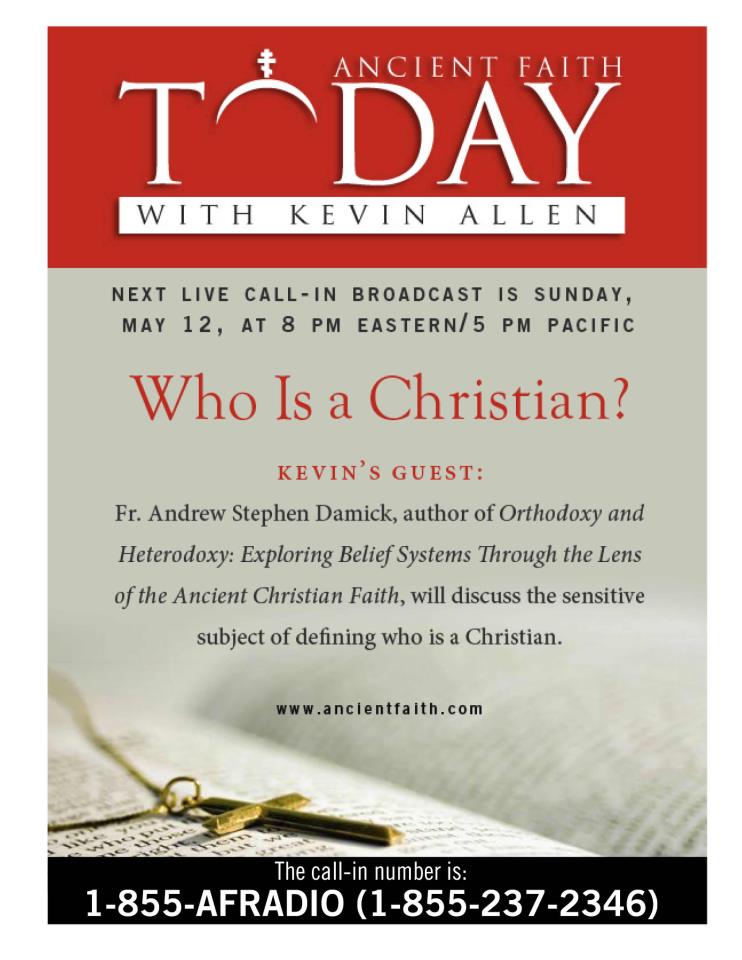On May 12, 2013, at 8-9:30pm EDT / 5-6:30pm PDT, Fr. Andrew Stephen Damick, author of Orthodoxy and Heterodoxy: Exploring Belief Systems Through the Lens of the Ancient Christian Faith (Conciliar Press, 2011) appeared on the live call-in show “Ancient Faith Today with Kevin Allen.”
The topic: “Who is a Christian?”
Fr. Andrew and Kevin discussed the sensitive subject of defining who a Christian is (and who a Christian is not!) in light of history, doctrine, ecclesiology, and the many non-Orthodox traditions.
“Ancient Faith Today” (AFT) is Ancient Faith Radio’s live call-in show streaming via the Internet, covering multiple topics, from pop culture to politics, from an Orthodox viewpoint with live guests. Calls are taken during the show, and it’s also recorded as a podcast for subsequent downloading.
Learn more about AFT (including how to tune in) here. AFT is also on Facebook.
Listen to the recording here.





Father Andrew,
I was fortunate to log on to Ancient Faith Radio on Sunday evening just when the dialogue between you and Kevin was airing. It was good to hear your voice and the tone and inflection in your speech. I have been following your blog since its inception, which was about the same time that I began to become interested in Orthodoxy. There have been times, I must admit, while reading your posts that I sensed someone like me was “put up with” but not really welcomed. However, I continue to return to your blog because I learn from you and the guest writers. I do not return to be consoled but to learn and listen.
Sunday evening I heard something from you I had not sensed before. I still sensed the same firmness, but what was new was I also sensed a little compassion . . . a little love trickled out from between your words.
And so hearing you speak has given me an additional glimpse of you. Now when I go back and read some things that you have written I can “hear” you a little better. Silly isn’t it?
You handled the dialogue on Sunday evening very well. You did say something that has caused me some concern though. What you said wasn’t wrong, in fact I’m sure it is right on target. I don’t recall the exact words, but the gist was . . . a person who spends the time to learn what they can about Orthodoxy and Roman Catholicism in seeking God with a sincere heart may just as easily chose the road to Rome as he may to Constantinople . . . and we can’t nail down why one would choose one way while the next may choose the other.” Something like that.
I stumbled onto Orthodoxy and am sensing that I will soon take the step to ask to become a catechumen. I would like to think the Spirit has somehow been involved. But I did not take the time to read Rome’s perspective. I just never listened to Rome. I don’t know if there is some deep, hidden prejudice against Rome in my mind or if I happened to read something about Orthodoxy that grabbed me. The voice calling me to Orthodoxy seemed so clear. Surely I don’t need to take another year to give an ear to Rome. Or do I? Will I regret it later? I know you can’t answer that. Forgive my ramblings.
Thanks be to God!
One of the things there wasn’t really time to address is how and why people convert to a new or different communion. The main reason most people seem to talk about as the only legitimate or authentic one is that someone examines all the possible evidence and then is compelled by the truth claims of a particular group. But the truth is that most people actually do not convert in that manner. Probably the biggest reason people convert is because they marry someone who already belongs to the group. But many also come for many other reasons—someone in the church was kind to them, they loved the appearance of the church, someone they knew brought them, it was the closest to their home, etc.
There is a sort of fatal flaw in the logic that the examine-all-the-evidence approach is the only possibly authentic one, and it is this: One cannot really know the truth about a faith until one belongs to it, probably for a long time. And one cannot possibly belong to all the possible faiths in the world long enough to know them all fully. So there just isn’t time to give everything a fair shake. So there is the practical reality that you just have to proceed as best you can with what you can yourself perceive.
While I am not qualified to give you spiritual advice (since I don’t know you), my general, hypothetical sense about what you mention is that you ought to go where you believe you can most humbly and seriously go. To be honest, my own examination of RCism has largely come long after the fact of having become Orthodox. FWIW, nothing has convinced me to change my mind about what I did, but it would be fair to say that I never really gave it a fair chance. But I also didn’t give a fair chance to Islam, Buddhism, Hinduism, Scientology, Swedenborgianism or Methodism, either. What can you do?
I thought you were kidding so I looked it up. There really is such a thing as Swedenborgianism! Surely I can mark that one off the list.
Thanks for replying.
Let that be a lesson to you to read my book. 😉
Okay Okay.
I will.
David, reading your original post makes me think that you are not aware of the podcasts that Fr. Damick has recorded for download on Ancient Faith Radio. They are “Roads from Emmaus” and “Orthodoxy and Heterodoxy”. I would encourage you to check them both out.
Christ is Risen!
Jim Orban